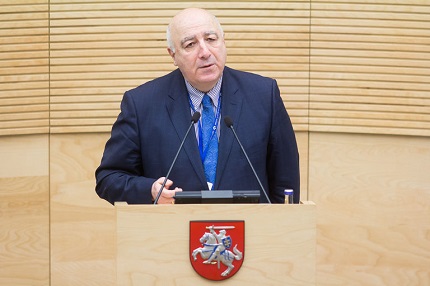A recent joint statement issued by U.S. Senators John McCain, Ben Cardin, Jeanne Shaheen, and Jim Risch, expressed disappointment over the criminal charges issued by the Chief Prosecutor of Georgia against Mikheil Saakashvili and other senior figures of the previous administration. The authors of the statement are long standing friends of Georgia in Washington D.C, and their personal contribution to our bilateral relationship is indisputable. It is for this reason that it is urgent to clarify the situation and the objections of the Georgian authorities to this statement.
The office of the Chief Prosecutor of Georgia has just issued a brief statement regarding the recent charges issued. In line with the principle of the autonomy of justice, I will refrain from commenting upon the substance of the case made by the Chief Prosecutor's Office. The very same principle should also constrain our friends in the U.S. Senate, unless there are grounds to suggest that the legal process violates the due process (a regrettably common practice during the nine years of the previous regime), in which case the rule of law as such is being challenged. Should this be the case, this joint statement must urgently be accompanied by concrete evidence.
As the State Department notes, "rule of law means both that everyone must comply with the law in a democratic society and that the legal system should not be used as a tool of political retribution." Therefore, those challenging the rule of law in Georgia must substantiate the claim that either certain individuals are beyond the reach of justice or that due process is being violated to achieve political retribution.
Both are very serious accusations against an allied nation, especially when they emanate from Washington D.C. This is an important point to make because the U.S. is not merely "an ally," but the most significant champion of Georgian independence, democratization and liberalization for nearly a generation. Along with the EU member states, the United States has provided material support, as well as mentored and monitored a painstaking transition process in Georgia. Nonetheless, democratic consolidation is not achieved merely by meeting a set of benchmarks. Consolidation, ultimately, requires confidence in due process, that is, a deep conviction that no one is above or beyond the law. Such confidence requires first and foremost the due and full investigation into all human rights abuse claims, and timely prosecution of past, present and future authorities who may have abused the power of their office, in a system that both checks and balances power. The importance of this principle of rule of law and accountability for past human rights violations was only last week recalled by the UN Human Rights Committee in its concluding observations on Georgia (United Nations Human Rights Committee, Concluding Observations on the fourth periodic report of Georgia - Advance unedited version, 23 July 2014, available at http://www.ccprcentre.org/doc/2014/07/CCPR_C_GEO_CO_4_17702_E.doc). This document calls on the Georgian State to pursue prosecutions for a number of incidents of abuse under the former regime, including specifically the "violent dispersal of peaceful demonstrations on 7 November 2007 - the case at hand. I would also refer you to the many human rights reports detailing the circumstances of the incidents under investigation, including the Human Rights Watch report of December 2007 (Human Rights Watch, Crossing the Line: Georgia's Violent Dispersal of Protestors and Raid on Imedi Television, December 2007, available at: http://www.hrw.org/reports/2007/12/19/crossing-line). Finally, it should also be noted that the work of the Georgian Office of the Chief Prosecutor benefits from the support and oversight of an international team of former prosecutors, including U.S. representative.
The question of "retributive justice" raised in the joint statement is quite beyond the scope of these cases. "Retribution" is a process that implies retrospective application of norms that have been adopted post facto. The dilemma is often raised in cases of regime change, often by evoking international law. In this case, the Chief Prosecutor is merely pursuing cases that were simply ignored in the past due to widespread impunity, on the basis of established norms, thereby embarking on a process of restoring public confidence in the rule of law. It should be recalled that one of the main factors contributing to the first change of government by means of legislative elections in 2012 were testimonies of politically motivated and systemic torture, verified by video footage that has not as yet been discredited. Such allegations can be rebuked, but not ignored.
On a more personal note, having served my country as an Ambassador in Washington and as a National Security Adviser and, by the way, the first Foreign Minister following the Rose Revolution when the foundations of our transatlantic partnership were being laid, I feel strongly that the bilateral cleavage emerging through this joint statement is both uncalled for and regrettable. This statement calls into question a process of democratization and institution-building which, ultimately, owes much to our joint work. I deeply regret this development. Both the Georgian Government and I hold each of the signatories to this joint statement in the highest esteem. We have worked together to put in place the norms and build the framework for rule of law in Georgia. We trust that, further to a review of the case at hand, they along with all our friends in the U.S., will provide the continued support and oversight to help ensure that justice and the rule of law in Georgia now move from theory to practice.

